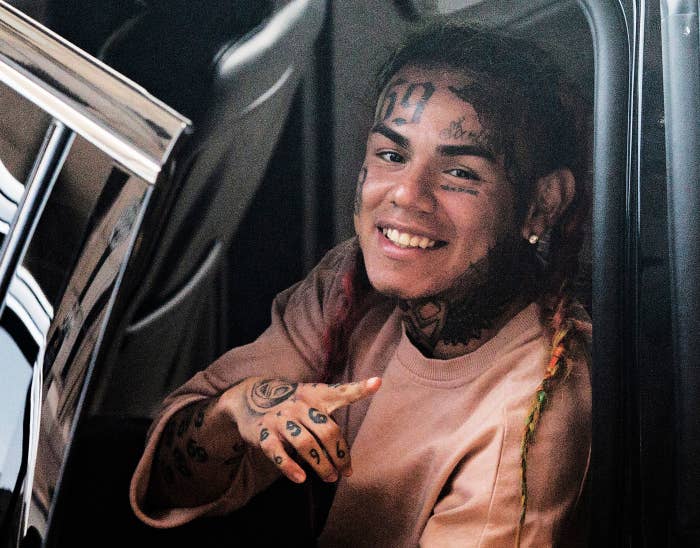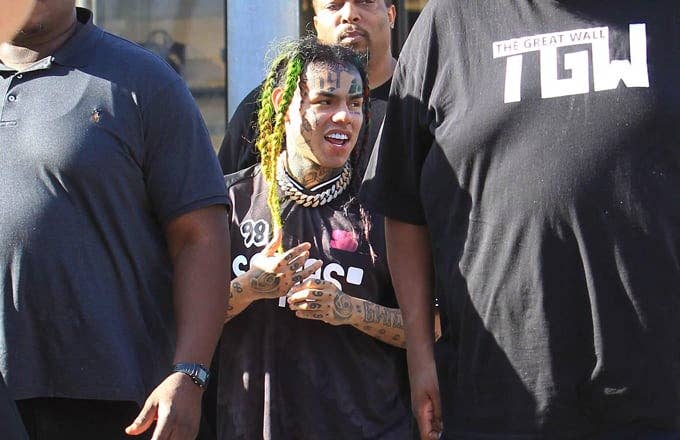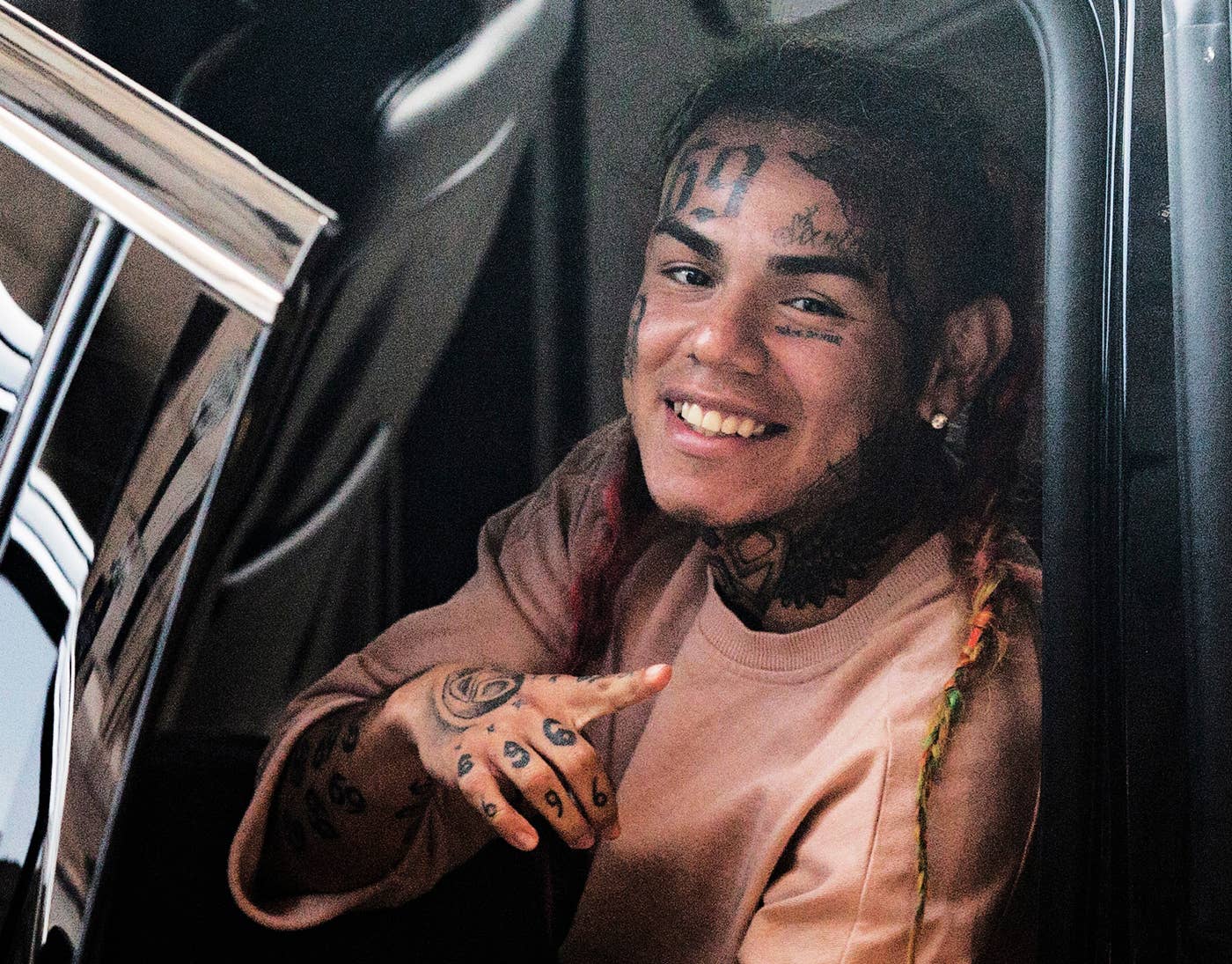
When 6ix9ine finished three days of testifying as a cooperating witness in the Nine Trey Gangsta Bloods trial, speculation began about what he would do next. If he received a reduced sentence, would he attempt to resume his music career? Or would he enter the federal witness protection program and completely disappear?
According to TMZ’s sources, 6ix9ine is strongly considering the option of continuing his music career and hiring 24/7 security instead of going into witness protection.
Ramon "Mundo" Mendoza has been in a situation very similar to the one 6ix9ine finds himself in now. In the 1970s, the ex-Mexican Mafia hitman testified against his former gang members in a RICO case and decided to enter witness protection, remove his tattoos, and take on a new identity. Looking at 6ix9ine's case, he believes there is only one clear option.
"As a former participant in the program, as a former bad guy, my strong recommendation for 6ix9ine as a human being would be to temporarily forsake whatever dollars and cents he's looking at and take advantage of implementing a protective service for a witness," he says. "Is it worth exposing yourself and getting whacked for a few dollars over your personal safety?"
Mendoza believes 6ix9ine's fame puts him at higher risk of retaliation from gang members, and a security team wouldn't be able to properly protect him.
"Being high-profile, if he's ever in the news and they ever determine where he's at, a Mickey Mouse security team ain't going to cut it," Mendoza says. "I'm sure these guys will be nicely trained and all that, but if you get some crazy kid to just go in and open fire, you're going to have collateral damage. I'd be more concerned about innocent people dying."
As 6ix9ine awaits sentencing, Mendoza thinks his best move is to start a new life.
"My advice is, don't look back," he says. "Don't covet any of that stuff and look forward. Embrace a complete transformation if you want to live. If you want to have one foot in the rap world, where you're perpetuating your own demise and your own danger, then don't blame anybody else."
Complex spoke with Mendoza about what the witness protection program is actually like and what the future could hold for 6ix9ine. The interview, edited and condensed for clarity, is below.

What happened when you entered witness protection?
I was testifying against my fellow confederates from the Mexican Mafia. In order to get into the witness protection program, you need to be sponsored by a U.S. attorney, and you have to be involved in a federal case. So I had left the Mexican Mafia and I was sponsored. The U.S. Marshals sat me down and explained that I would have to forsake all my ties, including family ties, and I would be giving up my identity. No correspondence. No phone calls. They even asked me to bring in all my paperwork, my birth certificate, credit cards, and anything that had my name on it. Basically, they killed me off. They killed Ramon Mendoza.
They put me up in a hotel, and there was no imminent urgency to move me while they went through the red tape and paperwork. In [6ix9ine's] case, I'm understanding he's in custody, and, more than likely, there would be no urgency, because he's already protected and they'll have all the paperwork ready. It would be a smooth transition from lockup to delivery into the hands of the U.S. Marshals.
When you sit down and sign the paperwork, it's kind of like buying a house, because there are so many questions and so many conditions. You basically agree not to be in touch with anybody, including friends and family. It's a painstaking process. The U.S. Marshals are very thorough. After you sign everything, the next thing is your assets. They make a determination, for example, that you don't owe anybody. They don't want somebody who is going to all of a sudden borrow a bunch of money, or do something underhanded just to gain some revenue. As far as assets, if you own a house and you're concerned, they tell you to sell it. Or put it under the name of whoever it is you want to put it under. Same thing with vehicles. I left a couple of cars to some people. As for cash, I remember making a deposit, and then they handled it on the other end, where I received my funds.
I actually flew to four different cities before my final destination. That's just the way they do it. They took me to an underground office that was like a bomb shelter. That's where they conducted the interview with me and the whole process. They had a team of agents that took me to my lodging, then they flew me to the cities. When I arrived at my final destination, I was picked up by some U.S. Marshals at the airport. They already have a description of what you look like and what you're wearing. They helped me with the basics, and they got me a vehicle. They helped me obtain a rental apartment. Basically, I looked at it like an extended vacation. I didn't really need the program, as far as finances go. I had some of my ill-gotten resources from back in the day that I could fall back on, and I felt like I had my act together mentally more than anything. But it turned out to be a blessing, because it gave me a couple of years to really assimilate into society. I was a John Doe.
I didn't have a recognizable face, but [6ix9ine] would have a different dilemma, unless they can do some good tattoo removal. They will do cosmetic surgery, tattoo removal, and stuff like that. That's what they did with me. They flew me to another location where they performed some surgery for tattoo removal, and they even did a cover-up on another tattoo.
I eventually left the program after everything was completed in the mid-'80s. When you leave, you "violate." When you violate, that's not a negative thing, like you committed a crime. It just means that the U.S. Marshals, for liability purposes, are no longer beholden to protecting you, because you don't want to be protected.
If you want to have one foot in the rap world, where you're perpetuating your own demise and your own danger, then don't blame anybody else. Don't look back.
You were saying you signed a bunch of paperwork. What were the major rules? Mainly that you can't contact people from your past life, right?
Yeah. That's the most important part of this. They want to make it crystal clear that you are not being given any type of latitude when it comes to connecting with anyone from your past. In my case, the only way that you make contact with a family member is if you go to the Marshals' office and make the phone call from there. All of it is set up ahead of time. Your law enforcement handlers, when you're on WITSEC, cannot even contact you. So, for example, if 6ix9ine ended up in the Midwest somewhere, and his handlers want to talk to him, they can't just pick up the phone or drive over to him. They would have to go through the U.S. Marshals and set up a neutral place to meet. It's very inconvenient for law enforcement, and that's why anything they want from you, they better get it before you go on WITSEC.
How strict are the U.S. Marshals when it comes to enforcing the rules? Do they check in with you often after you've been relocated?
In my days, it was a minimum of once a month, and that's when they would give you money. They would pay me in cash. When they gave me my stipend for the month, we'd get caught up. Like, is everything OK? How's the job situation looking? They try to let you loose on your own before they get involved in trying to help you with a job. They'd rather you do it on your own. I took care of all medical and dental issues. It was on the U.S. government to do it: dental, medical, tattoos, all that kind of stuff. And the rest of it for me was like an extended vacation. I wanted to get my head together, meet new people, and see other cultures. I was born and raised in a predominantly Mexican-American area. So everything I was familiar with was revolved around that culture. And then, of course, the gang culture was a separate thing.
When I left, and decided I was moving away from their protection, I determined that I was done with the case and finished everything I had to do. Legally, I wasn't in need of their protection anymore. The funding part is going to stop, anyway. It usually stops about two years after you're in. So I kind of maxed it out and then I let them know that I was going to leave. They said, "OK, thank you for letting us know." Most people, I'm sure, don't say this. So I left after notifying them, and I guess I left in good graces, although I legally violated the terms of the agreement. The only thing you retain from them once you violate their terms and leave them is your protected name. The identity they give you will never be taken.
You said you ended up getting plastic surgery and removed tattoos. Can you walk through that process a little bit more?
When I said plastic surgery, it was a tattoo removal. The way they did it was surgery. It wasn't laser back then. First, we discussed the tattoos and agreed that it was an identification issue for me. There were some Mexican Mafia-identifying tattoos, and there were some other ones that would make me identifiable. So, kind of like with [6ix9ine], anything and everything that is readily identifiable, including facial-type of tattoos, they would do that. They will remove the tattoos. I don't know of any reconstructive surgeries that they would perform, unless things have changed. But the tattoo removal is very important and they would do that. They did it back then. They flew me to another city for the removal. I think I was there for, like, a week, and they had to put me out at that time. I don't think you'd have to do that today. They also did a cover-up job on me.
Do you think the program worked well to keep you safe?
Yeah. I thought it was overkill. I didn't have an appreciation for the details like they did. At the time, I still had the attitude that if somebody tried something, I knew how to protect myself. I owned two firearms. I wasn't supposed to have guns, but I owned two of them. Obviously I didn't tell anybody. The measures they took were overkill, but that's what keeps people alive. I don't know what the track record is currently, but I read somewhere that they've never lost a witness who participated.
They've never lost a witness who followed all the rules.
Yeah. If you don't follow the rules, you're putting the target on yourself.
I developed a cover story, and I was consistent. I used a couple names for a fictitious son and daughter.
How much of your day-to-day life changed when you entered witness protection?
I was a street guy, and the friends I made were people from other walks of life. I became very friendly with a Puerto Rican family and we became like family. And I had a cover story. You have to come up with a cover story. When you're interacting with other people, you can't talk about your past. If you establish a relationship with someone, like a girlfriend, there's obviously pillow talk. But you have to remember your cover story. That came easy for me, because as a criminal, you don't reveal a lot of stuff, anyway. I developed a cover story, and I was consistent. I used a couple names for a fictitious son and daughter. I gave a reason for being there—a business reason. That kind of guided me through the whole thing. I became a very, very proficient liar.
Did they give you the backstory, or did you come up with your own?
I came up with my own. But I did run it by them, because they did ask. I'm sure they would be open to suggestions if [6ix9ine] can think of something original. I'm sure they would share something with him. But I wanted to be in control of my own story.
It sounds like you've been following the 6ix9ine story. As someone who has firsthand experience with a similar situation, would you suggest he go into witness protection?
As a former participant in the program, as a former bad guy, my strong recommendation for 6ix9ine as a human being would be to temporarily forsake whatever dollars and cents he's looking at and take advantage of implementing a protective service for a witness. Like I said earlier, it also helps for getting his head together and determining his direction. He can always go back to rapping.
Is it worth exposing yourself and getting whacked for a few dollars over your personal safety? That's a decision he's going to have to make. And everybody has an agenda. Law enforcement wants their witness protected. They want him safe, because they want him to testify in these cases. Once he's done testifying, the urgency from the people he's testifying against will diminish drastically, because they can no longer silence damaging testimony. So that'll diminish, but it'll never dissipate. Especially being high-profile, if he's ever in the news and they ever determine where he's at, a Mickey Mouse security team ain't going to cut it. I'm sure these guys will be nicely trained and all that, but you get some crazy kid to just go in and open fire, you're going to have collateral damage. I'd be more concerned about innocent people dying.
A Mickey Mouse security team ain't going to cut it.
6ix9ine has a unique situation. He was one of the most recognizable artists in the world before he was arrested, and he had millions of followers on social media. Do you think witness protection would even work for someone that famous?
The witness program was initially designed for mob informants. So you have a strong East Coast foundation there. Guys like Joseph Valachi. I could go on and on. I know we're in the 21st century, with the advancement of technology and everything. Minus those tattoos, he's just a Joe Blow. He's just like anybody else. He has nothing feature-wise that would stand out. Obviously, because of the number of tattoos, you're talking about a lot of work. Without the federal witness program, if he's got the finances to do what the federal witness program would do officially for him, plus additional muscles, then more power to him. If he's got those kinds of resources, then go fly yourself to Scandinavia or wherever and kick back in the Alps and do your rapping from a mountain top or something.
From a former bad guy, my advice is, don't look back. Don't covet any of that stuff, and look forward. Embrace a complete transformation if you want to live. That's the same exact advice I would give this guy. If you want to have one foot in the rap world, where you're perpetuating your own demise and your own danger, then don't blame anybody else. Don't look back.
If 6ix9ine entered witness protection and attempted to release music from hiding by getting someone to upload it online, would that violate the rules of the program?
While he's with them, I don't think they would allow it. The main reason is because the U.S. Marshals office is not in the business of brokering for anybody, including an entertainer. They're in the business of protecting people. The only way that he could do that and get it out would be to have contact with somebody, and they're not going to allow that. They're not going to make an exception just because he's a rapper. That would be my guess.
I would put money on it, if somebody ever knew exactly where he was performing, it wouldn't be a big deal to send a little team of guys to just take him out.
I know you've worked with other participants who have gone through the witness protection program. What's the biggest challenge that people have?
Going back. Going back to the lifestyle. Not going back to the organizations they came from. I've counseled and assisted former cartel assassins, people who were high up in the cartels, people who were involved with big drug distribution in the U.S., and Mexican Mafia members that were on WITSEC. I'm currently interacting with a lot of these people, and a lot of them go back to that lifestyle. For some of them, it's the drugs. The drugs are a big problem. It's a personal addiction that they go back to. There was a young lady who went back to the same kind of men, street guys, and she ended up committing suicide because she didn't know how to shift gears. 6ix9ine is a young man. It's not like he's got decades of indoctrination. So with him, it's probably the temptation of all the money that he knows he can make. But again, at what expense?
Do you think things could blow over for him? If he entered witness protection for 10 years, and then decided to leave it, does the danger go down over time when it comes to retaliation?
The urgency to have him killed because of imminent testimony that could put somebody away is no longer a factor, because they're already convicted and doing time. But now the reason becomes different. It becomes a revenge thing. I don't know about Black gangs, but with Hispanic gangs, I have a perpetual green light on me. With Black gangs, they may not have a perpetual green light on him. But I would put money on it, that if somebody ever knew exactly where he was performing, it wouldn't be a big deal to send a little team of guys to just take him out. So, to answer to your question, I don't think it's a viable option to go back to that world.
What would you say is the biggest misconception about witness protection?
That there's a guarantee that whoever enters a federal witness protection will be protected to the ultimate degree. They're only as good as the people they take in. So if they're allowed to do their job, they'll protect you to the ultimate. Nothing will happen to you. But if you fail to live up to any part of the agreement, then it's on you.

